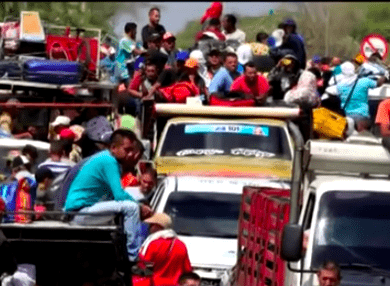Venezuelans Find U.S. Asylum Surprisingly Elusive
The Trump administration remains unwilling to accept additional refugees, despite its staunch criticism of the Maduro government. Venezuelan refugees are fleeing a country in economic collapse. (YouTube screen grab)
Venezuelan refugees are fleeing a country in economic collapse. (YouTube screen grab)
MIAMI—One was a Venezuelan army officer who deserted and joined the opposition. The other, a political activist who says he had to flee after pro-government forces attacked his home. They ended up in the U.S., among thousands of their countrymen seeking asylum in what seemed like an obvious place to do so.
But both men have been turned away, learning a hard lesson about the limits of asylum in the U.S. even for people from a collapsing country whose government the Trump administration has condemned.
Helegner Tijera Moreno, the former army officer, is being held at an immigration detention facility in New Mexico pending a final removal order or a last-minute reprieve after a judge rejected his asylum claim. The other man, Marcos Guada, was repatriated to Venezuela in July but quickly fled to the Dominican Republic.
They are still surprised — and somewhat bitter — that the U.S. rejected their asylum bids.
“I came here because I thought the United States was the principal opponent of the Venezuelan government and because I thought we had a good chance of help,” Tijera, 39, said by phone from the detention center. “Sadly, I was wrong.”
Venezuelans, whose country has grown increasingly authoritarian and lawless amid an economic collapse, now make up the largest group by nationality of people seeking asylum in the United States. But they are increasingly being denied and must either return to their country or join the more than 2 million who have become refugees in other countries.
“I was looking to save my life,” Guada recalls of his decision to leave. “My life was in danger.”
Nearly 28,000 Venezuelan asylum petitions, some for more than one individual, were submitted in 2017 by people making “affirmative” claims that they assert upon or after their arrival in the U.S. It was 50 percent more than a year earlier and five times as many as in 2015. Thousands more have made “defensive” claims to stave off deportation after visas expired or after their initial petitions were rejected.
Asylum claims typically take up to four years, though the Trump administration has been accelerating the process as part of a broader policy of increased immigration enforcement.
Last year, at least 250 Venezuelans were deported, up 36 percent from a year earlier. At least 258 were deported in the first half of this year. Another 265 are detained like Tijera, awaiting deportation. Officials won’t say how many had their asylum claims denied but lawyers and other experts say that it’s the majority.
The Transactional Records Access Clearinghouse, a data research organization at Syracuse University, found that nearly half the Venezuelan asylum applications that have come before immigration judges in the last five years have been denied. In comparison, nearly 90 percent of claims from Haiti and Mexico are denied while less than 20 percent of claims from Syria and about 10 percent from Belarus are denied.
To qualify for asylum, migrants must prove they face an imminent threat upon their return of persecution because of their race, religion, nationality, political opinion or membership in a particular social group.
“The general violence, the chaos, the economy aren’t enough,” said Juan Carlos Gomez, an immigration lawyer who runs a legal clinic at Florida International University in Miami. “Many Venezuelans apply for political asylum thinking they are coming out of hell and someone is going to protect them but, sadly, that’s not the law.”
Many Venezuelans believe they will be allowed to claim asylum because the U.S. has been such a staunch critic of the government of President Nicolas Maduro and his predecessor, the late Hugo Chavez.
“The American government is two-faced,” Guada said. “They say one thing and do another.”
Advocates for immigrants say asylum seekers misunderstand the system for a reason. “It is a contradiction in the U.S. immigration policy that we often condemn conditions in a foreign country and then deport people to those conditions,” said Royce Murray, policy director at the American Immigration Council.
U.S. Citizenship and Immigration Services won’t comment on individual cases but says it is upholding asylum laws that have been abused.
“The truth is that claims have skyrocketed across the board in recent years because migrants know they can exploit a broken system to enter the U.S., avoid removal, and remain in the country,” said Michael Bars, a spokesman for the agency.
Tijera would seem to have a strong case since he was a lieutenant in the army, and the support of the military is widely seen as key to Maduro being able to stay in power. Two members of the military were arrested this month for their alleged participation in an attempt to assassinate him by drone and Tijera believes he would be imprisoned and tortured if he returns.
He fled the Venezuela in January 2015, crossing the border into Colombia. He sought asylum in Italy but was turned down so he went to Mexico and sought asylum in the U.S. at a border checkpoint in Texas.
“If I were to go back they would put any kind of charge on me. They know I’m a traitor to the country,” he said.
Guada was a businessman back in Venezuela who was active in opposition campaigns in the northern state of Carabobo. He fled Venezuela in 2010, after government supporters attacked his home with rocks and broke down the door, eventually making his way to Laredo, Texas. There he was detained for nearly three months, then released on a $13,000 bond.
His wife had legal residency and his two sons have U.S. citizenship by birth but he still could not convince immigration authorities that he faced imminent danger back home. Eventually he exhausted his appeals and was deported in July.
“I am frustrated,” he said. “I don’t deserve this.”
Tijera was also unable to convince the judge that he faced arrest if he returns home. He was moved recently in the detention center and could be deported at any moment and fears the worst back in Venezuela.
Back in Venezuela this summer, Guada, now 50, wasn’t going to take any chances with an immigration judge back in the U.S. In three days, he boarded a plane and flew to the Dominican Republic, where he is living with his son.
“I was terrified because anyone who speaks against the regime can be silenced,” he said.
Your support matters…Independent journalism is under threat and overshadowed by heavily funded mainstream media.
You can help level the playing field. Become a member.
Your tax-deductible contribution keeps us digging beneath the headlines to give you thought-provoking, investigative reporting and analysis that unearths what's really happening- without compromise.
Give today to support our courageous, independent journalists.






You need to be a supporter to comment.
There are currently no responses to this article.
Be the first to respond.